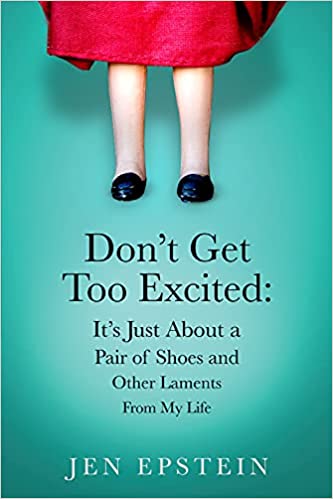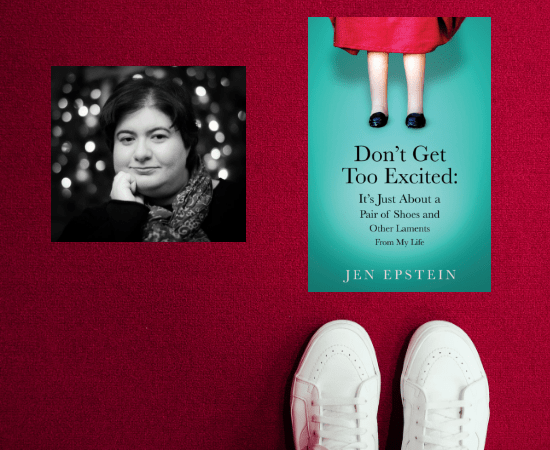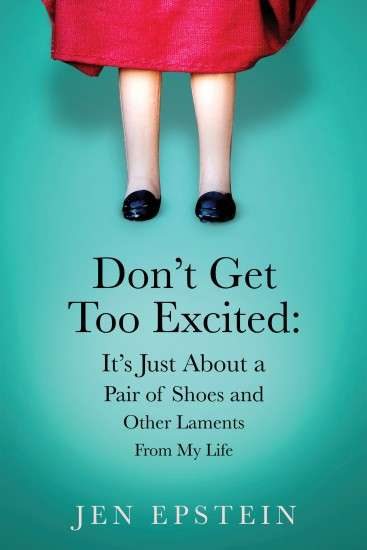Don’t Get Too Excited by Jen Epstein
If Jen Epstein wasn’t worrying about something, we’d all be worried. Such is the life of a born worrier. As a child she worried her uvula would break off and she would swallow it and choke to death. Then she worried high voltage wires would get her. Eventually, she was diagnosed with learning disabilities and later, Obsessive Compulsive Disorder.
All this fits into a nice, tidy package called Don’t Get Too Excited: It’s Just About a Pair of Shoes and Other Laments From My Life (Green Writers Press), in which Jen, with her self-depreciating humor, exposes her inner demons with stories that are sometimes heartbreaking and always deeply personal, tapping into the minutiae of her life with distinctive style and themes of universal appeal.
Even the book’s title, Don’t Get Too Excited, screams of her inner defenses to lower reader expectations, with of course the quiet inner hope that her audience may, in fact, feel some emotional high.
All this made us a little jittery about speaking with Jen. But as you’ll find in this exclusive interview, she provided such well-thought-out, intelligent, insightful and comical responses to our questions, that, well, uh, we got pretty excited.
![]()
BookTrib: It’s been said that worry is the disease of and for our troubled times. How do you use the theme of “worry” to create your literary voice and tell your story?
Jen Epstein: In today’s world we’re all living on a hamster wheel. We’re told we must be the best at everything. It’s enough to give even your most garden-variety neurotic an uncontrollable eyelid twitch, or to switch out one set of nervous tics with a new batch each day.
I use the theme of “worry” in Don’t Get Too Excited consistently and unapologetically. Pretty much EVERYTHING in my life centers around the theme of worry. Even answering these questions makes me worry!
When telling my story, I try to write about worry in ways that are relatable for the reader, such as having and raising children. The reader might not worry about having kids for the same reasons I do. But every parent worries about screwing up, about not being able to be there for their child as often or with as much patience as they would like. So even if they don’t have a paralyzing fear of bodily fluids and contamination, as I do—leading to my worry about changing dirty diapers—there is still plenty for the reader to latch on and relate to.
BT: What is the primary demographic of your targeted audience?
JE: I would say millennial and generation Xurbanites. Being in this age group is financially and professionally stressful, and living in high-maintenance cities like New York, LA, Chicago, Miami, DC, etc. adds on a whole other layer of stress.
City dwellers are probably the most likely to move into a new apartment every one to three years, most of us don’t have the luxury of doing laundry in our buildings, and we’re accustomed to having insipid verbal exchanges with other subway goers while commuting to or from work. I think my stories that lament humorously over these experiences will appeal to readers in this demographic.
BT: Why did you write this book?
JE: I wrote this book to help normalize OCD and reduce the stigma associated with mental health conditions in general. My hope is that people who have not sought out diagnosis and treatment will do so after reading these essays. And for those who have been diagnosed and currently are receiving treatment, to feel less alone after reading my story. If readers come away from the book realizing there are a lot more of us out there with stories to tell than one might think, then I will have achieved my mission.
BT: Was the book a therapeutic exercise for yourself or therapy for your readers to gain a better perspective on their own life issues? Or both?
JE: Both. Writing Don’t Get Too Excited has certainly been therapeutic for me in ways I could never imagine. I feel healthier, both physically and emotionally, focused, clearheaded, and more determined than ever to help others like me who struggle with OCD and mental health.
I would be thrilled—dare I say excited—if my stories helped others to gain a better perspective on their life issues, whether that includes OCD, Generalized Anxiety Disorder, or any other condition/situation that causes stress and distress in their lives.
BT: Did having learning disabilities and later Obsessive-Compulsive Disorder help or hinder your ability to get your story out and share your message?
JE: Yes, and yes! I’ve always thought of OCD as being both a blessing and a curse. I am detail-oriented to a fault. And sometimes that fault can delay getting the task at hand done. I have a tendency to zero in on details—such as in the editing process, where placement or order of words, for example, might seem too minute to bother with, but for me it means stop the presses!
On the other hand, I think having OCD and “neurotic” obsessive reactions allows me to tell stories that might not otherwise be told. For example, my story about working with a trainer. While I was writing that essay, my trainer e-mailed me to say she was terminating her business and we would no longer be able to work together. I was devastated and wasn’t sure I wanted to write the essay anymore. But after taking a few days to process what had just happened, I was able to use my anxiety and devastation to tell a better story.
BT: Describe the importance of the writers group you created with some co-workers.
JE: I don’t think these essays would have come to fruition without it. My co-workers past and present have been my sounding board for ideas. I could depend on them to give me honest and constructive criticism on what they thought worked and what didn’t. Writers group was also my support system and cheering section. I couldn’t have written “Forty-Eight Hours” about my experience being in the hospital, for example, without the support of writers group. It would have been too painful.
More importantly, writers group was the first place I revealed that I had OCD. I was worried that my co-workers would look at me differently. But as I mentioned, they found something relatable to latch on to —even though I was talking about living with OCD.
BT: Not that we are therapists around here, but the book’s title, Don’t Get Too Excited, sounds like you are downplaying expectations to others of something you are going to do, say or share. What do you think?
JE: You nailed it! The title, Don’t Get Too Excited, is intended to suggest the tone of the book as dry and self-deprecating. I try to keep this tone consistent, whether I’m writing about serious or more light-hearted subjects.
Perhaps also it’s to manage my own expectations of myself. In the beginning of the book, when I write about my childhood and relationship with my parents, it’s clear for various reasons that they had limited expectations of me. Though I spent the better part of my teenage and now adult years trying to prove them wrong, there’s still part of me that believes I will fail. I’m telling myself not to get too excited just in case they were right.
BT: In your introduction, you invite the reader to laugh, cry, gasp, roll your eyes, slam the book down, and think hard whether you even want to pick it up again. In other words, don’t get too excited. Is there ever a time when you would hope the reader DOES get excited?
JE: Well, of course deep down inside I want them to get excited about EVERYTHING. Shhh, I’ll never tell the reader that! Let’s call it reverse psychology. If my tone to the reader says, meh, whatever, it’s not really all that great, so don’t even bother, they will have the opposite reaction: What? Are you kidding? Not that great? It’s the best thing since sliced bread! Or, you know, something like that.
BT: Aha – that’s exciting! Moving right along, what’s the obsession with shoes, and how do they represent one of your themes?
JE: As I discuss in chapter five, “The Dressing Room,” buying clothes, especially shoes, is the bane of my existence. In a perfect world, I would be able to get away with being shoeless and wearing a burlap sack every day … though my fear of contamination might make walking around shoeless problematic on many levels. And yet, for me at least, shoes have been a part of my identity, my individualism, my quirkiness. Growing up, especially, my collection of Converse All-Stars told a very clear story about the person I was.
In Don’t Get Too Excited, shoes make cameo appearances at climactic points in the stories. My blue Puma suedes, for example. And the leather sandals that make my feet bloat. Shoes serve as a metaphor for life; whether brand new or the soles torn off, they are there in our lives through times of joy and times of strife, always ready to tell a story.
BT: What effect did the fact that your parents were mental health professionals have on your upbringing and the person you are today?
JE: Significant. Most kids don’t have fathers that tell them their friends’ mothers have an enmeshed personality or display narcissistic tendencies. No child should know what this means or have easy access to the DSM (Diagnostic Statistical Manual of Mental Disorders) to look the definition up. But I had easy access, and certainly on a rudimentary level, an understanding of the meaning of these terms.
I was in one form of therapy or another pretty much from the time I could walk. This certainly shaped my identity and point of view of myself and of others.
Having mental health professional parents also made me a great listener, it made me empathic, and I’d like to think it made me insightful. And if nothing else, it gave me some damn fine writing material to work with.
BT: Many of your stories revolve around your poking fun at everyday issues large and small – whether it’s fixing a TV or dealing with customer service or a laundromat, your propensity to steer clear of relationships, or your physical appearance. Why the diversity of topics – some minute and others very significant?
JE: All these topics, from minute to large, revolve around my everyday struggles of living with OCD. Yes, we’ve all dealt with customer service for our TVs or phones and wanted to punch a hole in the wall after doing so, but OCD makes it impossible for me to just say, “Ah, the hell with it, I’m going to bed!” I can’t just let it go. I must solve that problem. And while it’s funny to be on this wild rollercoaster ride with me, it’s also serious. My struggle to just “let it go” gives the reader who doesn’t cope with mental health issues a more in-depth understanding of what it’s like to live with this condition.
BT: What would you want readers to come away with after reading your book?
JE: An understanding that humor is our strongest antidote to heal. Without humor and being able to laugh at ourselves, what else is there?
Don’t Get Too Excited: It’s Just About a Pair of Shoes and Other Laments From My Life is now available to purchase.
Buy this Book!
Amazon






